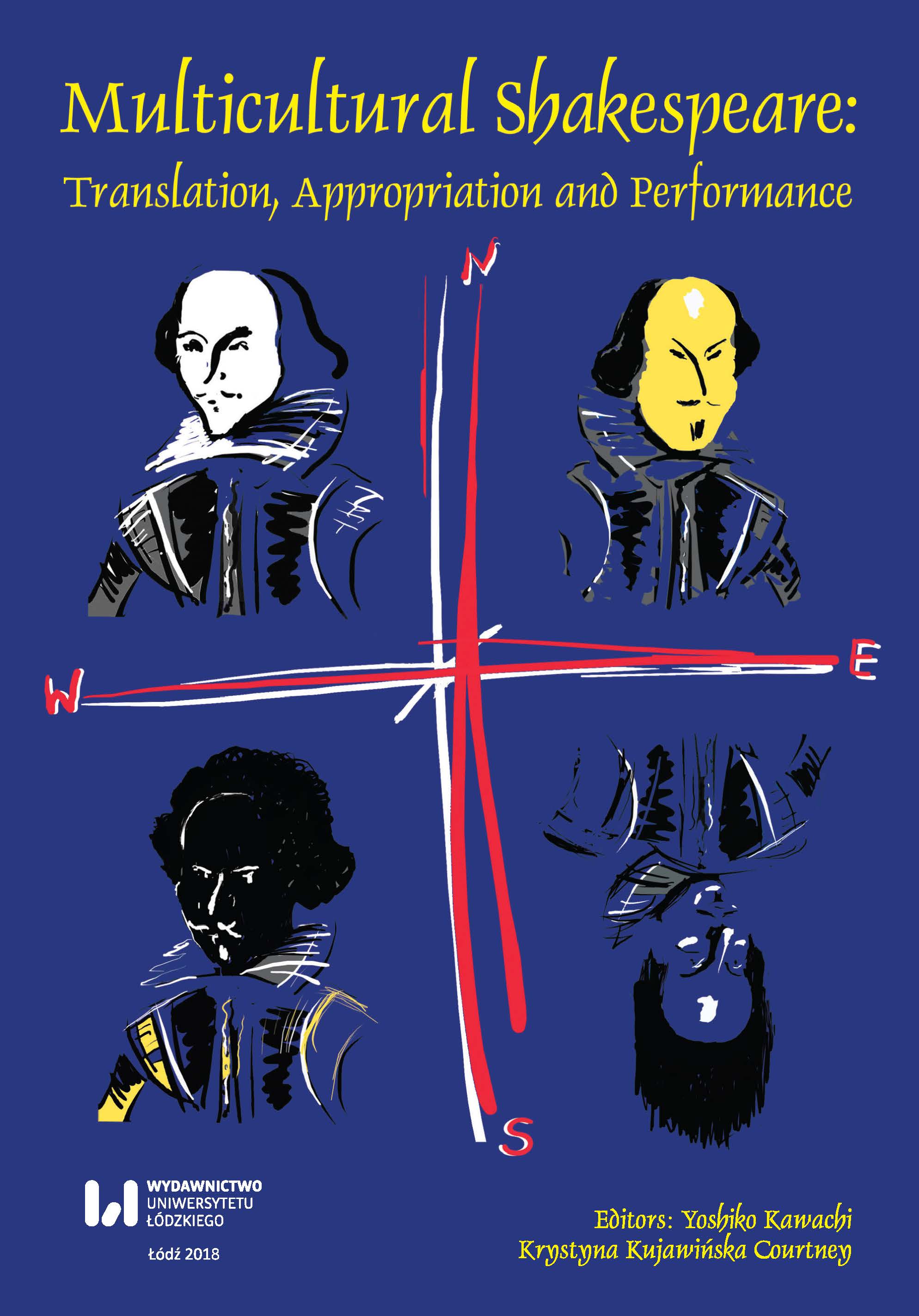Decentering the Bard: The Localization of "King Lear" in Egyptian TV Drama "Dahsha"
DOI:
https://doi.org/10.18778/2083-8530.18.10Keywords:
King Lear, The Arab Shakespeare, Adaptation, Localization, Dahsha, Local Shakespeare, Global ShakespeareAbstract
Dahsha [Bewilderment] is an Egyptian TV series written by scriptwriter Abdelrahim Kamal and adapted from Shakespeare’s King Lear. The TV drama locates Al Basel Hamad Al Basha, Lear’s counterpart, in Upper Egypt and follows a localized version of the king’s tragedy starting from the division of his lands between his two wicked daughters and the disinheritance of his sincere daughter till his downfall. This study examines the relationship between Dahsha and King Lear and investigates the position of the Bard when contextualized in other cultures, revisited in other locales, and retold in other languages. It raises many questions about Shakespeare’s proximity to the transcultural/transnational adaptations of his plays. Does Shakespeare’s discourse limit the interpretation of the adapted works or does it promote intercultural conversations between the varying worldviews? Where is the Bard positioned when contextualized in other cultures, revisited in other locales, and retold in other languages? Does he stand in the center or at the margin? The study attempts to answer these questions and to read the Egyptian localization of King Lear as an independent work that transposes Shakespeare from a central dominant element into a periphery that remains visible in the background of the Upper Egyptian drama.
Downloads
References
Aboubakr, Randa. “‘Yamna’ by Abdul-Rahman al-Abnudi.” Jadaliyya. 20 April 2017. http://www.jadaliyya.com/pages/index/6071/%E2%80%9Cyamna%E2%80%9D-by-abdul-rahman-al-abnudi
Google Scholar
“About.” Arabian Shakespeare Festival. 22 June 2017. http://arabianshakespearefestival.org/about/
Google Scholar
Barthes, Roland. Image-Music-Text. London: Fontana, 1977.
Google Scholar
Bortolotti, Gary R. and Linda Hutcheon. “On the Origin of Adaptations: Rethinking Fidelity Discourse and ‘Success’—Biologically.” New Literary History 38 (2007): 443-458.
Google Scholar
Bradley, A. C. Shakespearean Tragedy. New Delhi: Atlantic Publishers and Distributors, 2000.
Google Scholar
Butcher, S.H., ed. The Poetics of Aristotle. Trans. Butcher, S.H. 3rd ed. London: Macmillan and Co. Limited, 1902.
Google Scholar
Chaudhuri, Sukanat and Chee Send. “Introduction.” Shakespeare without English: The Reception of Shakespeare in Non-Anglophone Countries. Eds. Sukanat Chaudhuri and Chee Seng Lim. India: Dorling Kindersley, 2006. vii-xvi.
Google Scholar
Dahsha. Shahid.mbc.net. 29 June 2014. https://shahid.mbc.net/ar/series/79174/%D8%AF%D9%87%D8%B4%D8%A9.html
Google Scholar
Fischlin, Daniel and Mark Fortier, eds. Adaptations of Shakespeare: A Critical Anthology of Plays from the Seventeenth Century to the Present. New York: Routledge, 2000.
Google Scholar
Foakes, R.A. Hamlet Versus Lear: Cultural Politics and Shakespeare’s Art. Cambridge: Cambridge University Press, 1993.
Google Scholar
“Genesis 3:1.” Biblia.com. 20 May 2017. https://biblia.com/books/esv/Jn1.1
Google Scholar
Grebanier, Bernard D. et al. English Literature and Its Backgrounds. New York: Holt, 1950.
Google Scholar
Heloise, Sainte. “Adaptations of King Lear: Always Political?” Academia.com. 10 April 2017. https://www.academia.edu/3794750/Adaptations_of_King_Lear_always_political?auto=download
Google Scholar
Holderness, Graham. “Arab Shakespeare.” MIT Global Shakespeares. 25 July 2015. http://globalshakespeares.mit.edu/blog/2013/07/25/arab-shakespeare/
Google Scholar
Huang, Alexander C.Y. “Shakespearean Localities and the Localities of Shakespeare Studies.” Shakespeare Studies 35 (2007): 186-204.
Google Scholar
Huang, Alexander C.Y. “Shamlet: Shakespeare as a palimpsest.” Shakespeare without English: The Reception of Shakespeare in Non-anglophone Countries. Eds. Sukanat Chaudhuri and Chee Seng Lim. India: Dorling Kindersley, 2006. 21-45.
Google Scholar
Hutcheon, Linda and Siobhan O’Flynn. A Theory of Adaptation. New York: Routledge, 2013.
Google Scholar
Im, Yeeyon. “The Lure of Intercultural Shakespeare.” Medieval and Early Modern English Studies 15. 1 (2007): 233-253.
Google Scholar
Kahn, Coppélia. “The Absent Mother in King Lear.” Rewriting the Renaissance: The Discourses of Sexual Difference in Early Modern Europe. Eds. Margaret W. Ferguson, Maureen Quilligan and Nancy Vickers. Chicago: University of Chicago Press, 1986. 238-262.
Google Scholar
“List of Snakes That Live in Egypt.” MOM.ME. 14 April 2017. http://animals.mom.me/list-snakes-live-egypt-8095.html
Google Scholar
Loomba, Ania and Martin Orkin, eds. Post-colonial Shakespeares. London: Rutledge,1998.
Google Scholar
Mahmoud, Muhsen. “Abdelrahim Kamal: I Read King Lear Twenty Times and it is One of the Most Egyptian Shakespearean Plays.” Al Masry Al Youm 9 August 2014. http://www.almasryalyoum.com/news/details/497993
Google Scholar
Marsden, Jean I. The Re-Imagined Text: Shakespeare, Adaptation, & Eighteenth Century Literary Theory. Lexington, Kentucky: The University Press of Kentucky, 1995.
Google Scholar
McClinton, Brian. “Humanism in the Renaissance.” Humani 98 (March 2006): 10-16.
Google Scholar
“MIT Global Shakespeares: Arab World.” MIT Global Shakespeares. 2 October 2017 http://globalshakespeares.mit.edu/#
Google Scholar
Shakespeare, William. King Lear. Shakespeare Online. 25 May 2017. http://www.shakespeare-online.com/plays/learscenes.html
Google Scholar
“William Shakespeare.” IMDb. 2 October 2017 http://www.imdb.com/name/nm0000636/
Google Scholar
Downloads
Published
How to Cite
Issue
Section
License

This work is licensed under a Creative Commons Attribution-NonCommercial-NoDerivatives 4.0 International License.












